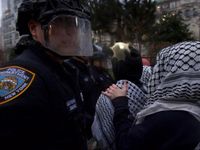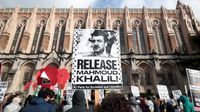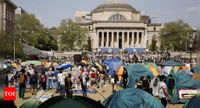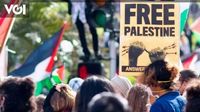Columbia University has been at the forefront of controversy lately, particularly surrounding its handling of protests related to Israel and the implications of federal demands. The university is considering compliance with President Trump’s demands, including a campus-wide mask ban and a crackdown on anti-Israel protests, all while facing a looming deadline and the potential loss of $400 million in federal funding.
The scrutiny intensified following a letter from federal agencies on March 13, 2025, which instructed Columbia to strictly enforce disciplinary measures against those involved in the violent takeover of Hamilton Hall by masked anti-Israel protesters back in April 2024. While Columbia has taken steps such as multi-year suspensions and expulsions, details about specific students and number of cases remain undisclosed due to privacy laws.
Amidst these developments, Columbia's interim president, Katrina Armstrong, has emerged as a contentious figure. She has defended the administration’s actions, stating that the concerns raised by the federal government were legitimate, signaling a complex balance between compliance and academic independence. However, her comments haven’t quelled the increasing dissent within the university community.
The atmosphere at Columbia became even more charged when Mahmoud Khalil, a Palestinian graduate student, was arrested by U.S. immigration agents on March 8, 2025. Khalil, who was actively involved in pro-Palestine protests, described his detention as indicative of anti-Palestinian racism among both the Biden and Trump administrations. He expressed through a letter distributed by his attorney that his detention reflected systemic issues related to U.S. foreign policy towards Palestine and the treatment of activists.
Khalil’s arrest came as part of a broader crackdown on student activism related to Palestine. On March 5, police forcibly dispersed a peaceful sit-in at Columbia’s Barnard College, arresting nine students advocating for the reversal of expulsions of other pro-Palestinian activists. Such incidents have raised alarm among students who perceive the actions as part of a systematic effort to quash free speech on campus.
The protests themselves were part of a larger movement against Israel's military activities in Gaza, igniting conversations on antisemitism, Islamophobia, and racism within university environments. The juxtaposition of demonstrations and counter-protests has highlighted contentious debates surrounding free speech and academic freedom.
As repercussions from protests escalated, Columbia faced increased scrutiny. The Trump administration officially withdrew $400 million in federal funding amid accusations of the university’s failure to adequately address antisemitism on campus, declaring that Columbia had been inactive regarding persistent harassment of Jewish students.
A significant part of the critique aimed at Columbia is the perception of compromise on moral authority in exchange for governmental funding and support. Many trustees are divided, with some advocating compliance while others express concerns over the erosion of the university's autonomy.
In Khalil’s case, his trial represents more than an individual’s struggle with immigration policy; it reflects the broader context of a stifling political climate for Palestinian voices in the U.S. Khalil, along with his attorney, has connected his experience to the broader issues of free expression and justice, denouncing the lack of freedoms for Palestinian activists.
As the tension mounts, students at Columbia continue to push for a reevaluation of the institution's commitments to academic freedom, arguing that current practices infringe upon their rights to protest. Further, they identify significant contradictions in the administration's responses to various protests based on the subject matter at hand.
Within this charged environment, activists emphasize the importance of solidarity, advocating for students targeted for their political beliefs. Khalil’s statement regarding his treatment underscores a call for broader awareness and action against policies perceived as unjust.
The ongoing developments at Columbia University raise pressing questions regarding the intersection of academia and politics, highlighting the consequences of federal intervention in university governance. How institutions respond may set a critical precedent for future activism in higher education, potentially affecting student rights and institutional integrity.
Khalil’s situation exemplifies the precarious balance that universities must navigate between upholding academic freedom and adhering to federal demands. As funding pressures escalate, the fate of student activism hangs in the balance.
Columbia's actions will likely influence other institutions grappling with similar pressures, inviting scrutiny and potential changes in how universities maintain their moral and academic integrity against external influences. Observers are watchfully awaiting the outcome of this situation, as the implications extend far beyond Columbia’s campus.







